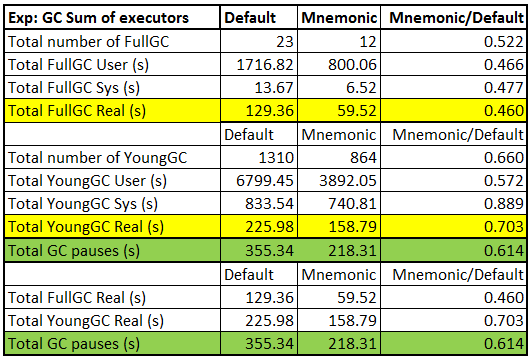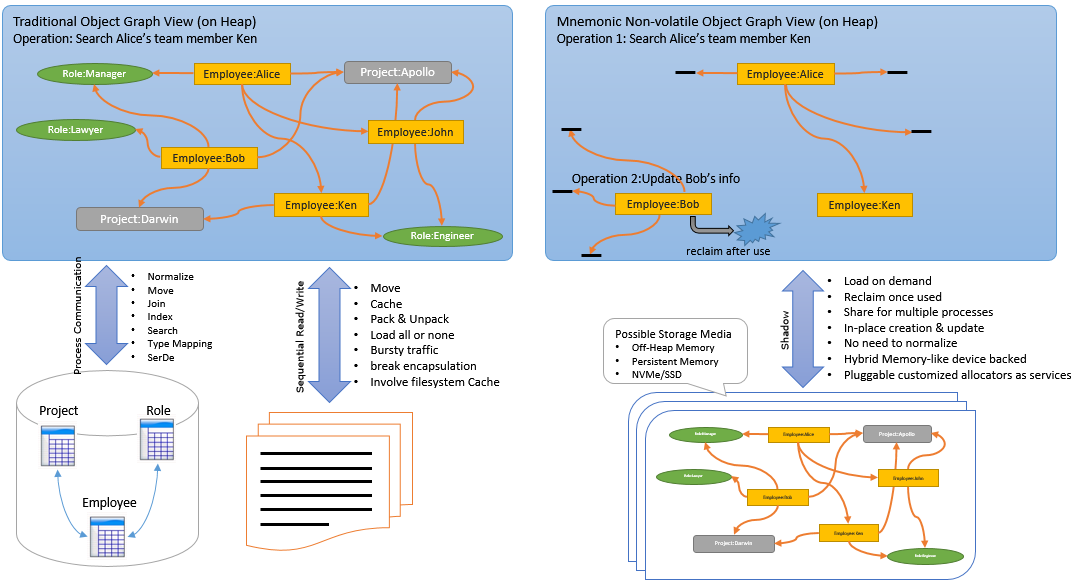(This project has been manually tranferred from https://github.com/bigdata-memory/bdmem)
This library comes up with a new programming model we call it non-volatile object programming model, this model directly offloads object graphs into a variety of memory-like devices e.g. SSD, NVMe, Off-heap, in this way, it brings some promising features for massive data processing and high performance computing.
- In-place data storage on local non-volatile memory
- In-place generic Java object persistence
- Object graphs lazy loading & multi-process sharing
- Auto-reclaim memory resources and Mnemonic objects
- Hierarchical cache pool for massive data caching
- Pluggable allocator services for extension & optimization
- A set of non-volatile data structures (WIP)
- Minimize memory footprint on Java heap
- Reduce GC Overheads as the following chart shown (collected from Apache Spark experiments)
- [Coming major feature]: Distributed Object Graphs (DOG)
- [Coming major feature]: Columnar-aware object graphs & collections (Apache Arrow based optimization)
/**
* a non-volatile class should be abstract, implement Durable interface and marked with @NonVolatileEntity annotation
*/
@NonVolatileEntity
public abstract class Person<E> implements Durable, Comparable<Person<E>> {
E element; // Generic Type
/**
* callback for this non-volatile object creation
*/
@Override
public void initializeAfterCreate() {
System.out.println("Initializing After Created");
}
/**
* callback for this non-valatile object recovery
*/
@Override
public void initializeAfterRestore() {
System.out.println("Initializing After Restored");
}
/**
* setup generic info manually to avoid performance penalty
*/
@Override
public void setupGenericInfo(EntityFactoryProxy[] efproxies, GenericField.GType[] gftypes) {
}
@Test
public void testOutput() throws RetrieveNonVolatileEntityError {
System.out.printf("Person %s, Age: %d ( %s ) \n", getName(), getAge(),
null == getMother()? "No Recorded Mother" : "Has Recorded Mother");
}
public int compareTo(Person<E> anotherPerson) {
int ret = 0;
if (0 == ret) ret = getAge().compareTo(anotherPerson.getAge());
if (0 == ret) ret = getName().compareTo(anotherPerson.getName());
return ret;
}
/**
* Getters and Setters for non-volatile fields marked with @NonVolatileGetter and @NonVolatileSetter
*/
@NonVolatileGetter
abstract public Short getAge();
@NonVolatileSetter
abstract public void setAge(Short age);
@NonVolatileGetter
abstract public String getName() throws RetrieveNonVolatileEntityError;
@NonVolatileSetter
abstract public void setName(String name, boolean destroy) throws OutOfPersistentMemory, RetrieveNonVolatileEntityError;
@NonVolatileGetter
abstract public Person<E> getMother() throws RetrieveNonVolatileEntityError;
@NonVolatileSetter
abstract public void setMother(Person<E> mother, boolean destroy) throws RetrieveNonVolatileEntityError;
@NonVolatileGetter
abstract public Person<E> getFather() throws RetrieveNonVolatileEntityError;
@NonVolatileSetter
abstract public void setFather(Person<E> mother, boolean destroy) throws RetrieveNonVolatileEntityError;
} // create an allocator instance
BigDataPMemAllocator act = new BigDataPMemAllocator(1024 * 1024 * 8, "./pobj_person.dat", true);
// fetch handler store capacity from this non-volatile storage managed by this allocator
KEYCAPACITY = act.handlerCapacity();
....
// close it after use
act.close(); // create a new non-volatile person object from this specific allocator
person = PersonFactory.create(act);
// set attributes
person.setAge((short)rand.nextInt(50));
person.setName(String.format("Name: [%s]", UUID.randomUUID().toString()), true);
// keep this person on non-volatile handler store
act.setHandler(keyidx, person.getNonVolatileHandler());
for (int deep = 0; deep < rand.nextInt(100); ++deep) {
// create another person as mother
mother = PersonFactory.create(act);
mother.setAge((short)(50 + rand.nextInt(50)));
mother.setName(String.format("Name: [%s]", UUID.randomUUID().toString()), true);
// set the person's mother
person.setMother(mother, true);
person = mother;
} for (long i = 0; i < KEYCAPACITY; ++i) {
System.out.printf("----------Key %d--------------\n", i);
// iterate non-volatile handlers from handler store of this specific allocator
val = act.getHandler(i);
if (0L == val) {
break;
}
// restore person objects from this specific allocator
Person<Integer> person = PersonFactory.restore(act, val, true);
while (null != person) {
person.testOutput();
// iterate all mother's ancestors
person = person.getMother();
}
}Please see the file LICENSE for information on how this library is licensed.
- core -- the submodule project for core
- collections -- the submodule project for generic collections
- examples -- the submodule project for examples
- allocator-services/pmalloc-service -- the submodule project for pmalloc allocator service
- allocator-services/nvml-vmem-service -- the submodule project for vmem allocator service
- allocator-services/service-dist -- the location of pluggable allocator services (auto-generated)
To build this library, you may need to install some required packages on the build system:
- Maven -- the building tool v3.2.1 or above [Required]
- NVML -- the NVM library (Please compile this library that is tagged with 0.1+b16) (http://pmem.io) [Optional if nvml-vmem-service is excluded]
- JDK -- the Java Develop Kit 1.6 or above (please properly configure JAVA_HOME) [Required]
- PMFS -- the PMFS should be properly installed and configured on Linux system if you want to simulate read latency [Optional]
- PMalloc -- a supported durable memory native library at https://github.com/bigdata-memory/pmalloc.git [Optional if pmalloc-service is excluded]
- Javapoet -- a dependant project v1.3.1-SNAPSHOT revised for this project at https://github.com/wewela/javapoet.git [Required]
Once the build system is setup, this Library is built using this command at the top level:
$ mvn clean packageTo exclude a customized allocator service for your platform e.g. OSX, note that if you excluded one or both allocator services, some or all testcases/examples will fail since their allocator is unavailable.
$ mvn -pl '!allocator-services/nvml-vmem-service' clean packageTo build and run the unit tests:
$ mvn clean package -DskipTests=falseTo install this package to local repository (required to run examples and testcases):
$ mvn clean installTo run an example:
$ mvn exec:exec -Pexample -pl examples # requires 'vmem' allocator service to run, please refer to the code of test cases for more examples.To run several test cases:
$ mvn -Dtest=NonVolatilePersonNGTest test -pl core -DskipTests=false # a testcase for module "core" that requires 'pmalloc' allocator service to pass
$ mvn -Dtest=BigDataMemAllocatorNGTest test -pl core -DskipTests=false # the second testcase for module "core" that requires 'vmem' allocator service to pass
$ mvn -Dtest=MemClusteringNGTest test -pl core -DskipTests=false # the third testcase for module "core" that requires 'vmem allocator service to pass
$ mvn -Dtest=NonVolatileNodeValueNGTest test -pl collections -DskipTests=false # a testcase for module "collection" that requires 'pmalloc' allocator service to pass
$ mvn -Dtest=NonVolatilePersonNGTest test -pl collections -DskipTests=false # another testcase for module "collection" that requires 'pmalloc' allocator service to pass


